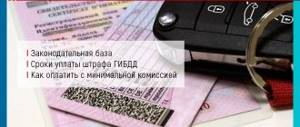It happens that employees are dishonest in their duties, because of which not only the common cause suffers - the organization can be fined. It would seem that if the unexpected financial costs are the employee’s fault, collecting them from him would be a fair decision. But is this so by law? Is it possible to reimburse the amount of an administrative fine imposed on an organization at the expense of the guilty employee? We'll figure out.
Question: Based on the results of a documentary check carried out by the State Labor Inspectorate of compliance with labor legislation, the pharmacy organization was found guilty of committing an administrative offense under Part 1 of Art. 5.27 of the Code of Administrative Offenses of the Russian Federation, and was fined. Having paid the fine and found out whose fault this violation occurred, the pharmacy decided to recover the amount of material damage from the guilty employee. Is such a decision legal? View answer
Varying degrees of responsibility
An organization, that is, a legal entity, cannot itself commit illegal actions. Specific people are always guilty of them - intentionally, through negligence or mistake. Who will be responsible for this? Supervisory authorities usually decide.
FOR YOUR INFORMATION! Fines imposed on organizations are usually several times larger than the corresponding amounts provided for fining officials.
Administrative legislation, the main sanction of which is a monetary fine, provides for the prosecution of both the legal entity as a whole (“fine on the organization”) and specific officials. As a rule, this is the management or chief accountant of the company.
Question: Can a director, confident that the accountant is to blame for the violation, recover from him the amount of damage in the amount of the fine imposed on the organization? View answer
Pay, since you are financially responsible?
Certain categories of workers - cashiers, storekeepers, accountants, etc. – bear full or partial financial responsibility for their activities, this is reflected in their employment contracts. If the company suffers financial loss as a result of their mistake, they are legally obligated to pay it back. Art. 233 of the Labor Code of the Russian Federation states that an unlawful action or inaction that caused direct actual damage is the basis for its material compensation by the guilty party. But there are serious nuances in this legislative norm:
- the injured party must prove the damage caused to it and its extent;
- direct actual damage is a decrease or deterioration in the condition of fixed assets or property owned by the employer or third parties.
Thus, a formal administrative fine, even imposed due to the fault of an employee, cannot be recognized as direct damage to the company. This means that there is no direct legislative justification for compensating the amount of an administrative fine from an employee.
Can an organization recover an administrative fine imposed on it from an employee involved in a violation ?
Checking and paying traffic fines50% discount
We are checking information about fines, please wait a few seconds
Drivers are also fined if they do not wear a seat belt; stopped in the middle of the road, on an oncoming junction or overtaking lane; did not allow a pedestrian to pass; the wrong windows were tinted; transport children unfastened or without a child seat; park in the wrong place.
Why is it difficult to collect a fine from the culprit?
The indicated interpretation of the law makes it possible to collect a fine from an employee guilty of imposing it in two ways. There are several reasons for this:
- The fine is paid by the person found guilty by the relevant authorities. And in the protocols of inspectors, specific persons are mentioned extremely rarely; supervisory authorities appeal to the company, and not to specific individuals. It turns out that the employee himself is not held administratively liable by law.
- A culpable act or omission is not always actually within the employee’s job responsibilities. If the case goes to court, all documentary evidence is raised and the wording is carefully studied. And if the employment contract or charter does not directly state that the action performed or not performed was actually the responsibility of this particular employee, there will no longer be any grounds for collecting a fine from him.
- Many actions or inactions that turn out to be guilty are classified by the court as an ordinary business risk for which a specific person cannot be held accountable.
- If the fine was paid by the employee, this will mean that his employer did not receive an administrative penalty, while a legal entity’s evasion of administrative liability is not allowed.
- The court most often sides with workers as the least protected party. It is the employer who must prove the guilt of his employee and the amount of damage caused, and doubts in such cases are usually interpreted in favor of the defendant.
The question of the possibility of collecting from an employee the amount of an administrative fine of a company due to his fault in practice is resolved ambiguously. Judges in most cases defend the rights of workers and recognize that it is unlawful to collect a fine imposed on an organization from an employee. View the court's opinion
Is it possible to pay an overdue debt on the spot?
Yes. And no one can stop you from doing this. The most common plot of such events is as follows:
- you are stopped by a traffic police inspector for a violation or to check documents,
- checks for debts and discovers a fine for which the 60-day period for payment has expired and the statute of limitations for prosecution under 20.25 of the Code of Administrative Offenses has not expired,
- most often, the employee himself offers to pay the late payment and, thus, lets you go, but there are cases when he draws up a protocol in any case (the inspector himself cannot consider cases under this article by law),
- while he is writing the case materials, you quickly pay this overdue fine through a mobile application (for example, Sberbank-online) and show the inspector the receipt on your smartphone; or the inspector asks to pay it on the spot, but still draws up a protocol to transfer the case to court.
Is it possible, in principle, under the legislation of 2021, for such a denouement of events to avoid a double fine for late payment or administrative arrest?
You will also be interested in:
- If you fled the scene of an accident? Punishment, what to do and how does it work?
- Can bailiffs write off a fine from a credit card?
- How to pay a traffic police fine to bailiffs?
Presumption of guilt
There are representatives of the organization who are a priori considered guilty of all the troubles that occur, including financial ones. These are those individuals who pay for increased wages and a high rank with an increased degree of responsibility, including for the actions of their subordinates. We are talking about representatives of the management level.
Is it possible to recover from an employee an administrative fine paid through his fault by an organization ?
In 2014, amendments were made to the Civil Code of the Russian Federation stating that directors and collegial management bodies are obliged to compensate for any losses caused as a result of erroneous decisions - this is part of normal business risk.
IMPORTANT! Disputes regarding compensation of this kind fall within the competence of civil law rather than the Labor Code of the Russian Federation and are considered in arbitration court. Most often, decisions are made not in favor of managers.
A company that pays a fine due to the fault of the general director (most often by that time already former) has a fairly good chance of winning a lawsuit to recover this amount from him, as evidenced by numerous precedents.
The violation was committed by the employee, but the fine was paid by the employer. Is there a subject to personal income tax?
The Russian Ministry of Finance believes that the fine paid by an organization for violating traffic rules is direct actual damage for it. And the driver who committed a violation is always obliged to compensate for it in accordance with the rules on financial liability. But, in our opinion, such a position has no judicial prospects.
LET'S CONSIDER THE SITUATION
The commentary letter deals with a very common situation. The company received by mail a resolution in the case of administrative liability for violating traffic rules (traffic rules). The offense was recorded on a CCTV camera. Perhaps this is exceeding the established speed (Article 12.9 of the Code of Administrative Offenses of the Russian Federation) or driving into oncoming traffic (Part 4 of Article 12.15 of the Code of Administrative Offenses of the Russian Federation). The fine was paid by the company from the current account. Officials are convinced that due to the payment of the fine, the company suffered direct actual damage in the form of a real decrease in funds. Obviously, the culprit of the damage is the driver who was driving the car. However, the company did not hold him financially liable, but exercised the right to refuse to recover damages from the employee (Article 240 of the Labor Code of the Russian Federation). But financiers regarded such actions by the employer as releasing the employee from a certain property obligation. In their opinion, in this regard, the latter received economic benefits (Article 41 of the Tax Code of the Russian Federation). This means that he has income subject to taxation. The ministry's position, of course, is beneficial to the budget, but unfavorable for the staff. After all, specific employees are actually behind the majority of penalties collected from companies. Moreover, it does not matter under what legislation the fine was paid - for economic, tax or administrative violations. And shifting fines onto workers is not widely practiced. More often than not, companies deprive workers of bonuses. But if the company, being obliged to withhold personal income tax (and having such an opportunity in relation to employees) and transfer it to the budget, did not do this, then it is liable under Article 123 of the Tax Code of the Russian Federation: it faces a fine of 20 percent of the corresponding personal income tax amount. GENERAL OBJECTIONS
Let's start with general objections. Firstly, the letter of the Ministry of Finance of Russia dated November 13, 2010 No. 03-03-06/2/197 deserves attention. True, it concerns the forgiveness of sanctions imposed on an individual within the framework of civil law relations. It explains that the debtor does not have an economic benefit if he has not recognized the amount of fines, penalties and (or) other sanctions for violation of contractual obligations, as well as if there is no court decision on their award. But a similar approach is applied in labor legislation. Article 240 of the Labor Code of the Russian Federation talks about refusal to recover damages not just from the employee, but specifically from the guilty party. Article 233 of the Labor Code of the Russian Federation also emphasizes that the financial liability of a party to an employment contract arises in the event of its guilty behavior. Meanwhile, the employee’s guilt must either be admitted by himself (voluntarily) or established by the court. This follows from paragraph 2 of Article 248 of the Labor Code of the Russian Federation. Establishing his guilt is not within the competence of the employer. Consequently, in a situation where an employee does not agree to voluntarily compensate for the damage caused to the employer and there is no court decision to recover damages from him, he does not have a property obligation to the employer. And if so, then it is unlawful to talk about the employer’s refusal to recover damages. After all, such a refusal is possible if there is a right to recover damages. Secondly, judicial practice does not support the opinion expressed in the commented letter. Judges do not believe that the payment of an administrative fine by an employer is direct actual damage. This is approved in the rulings of the Primorsky Regional Court dated 04.13.11 No. 33-3449 and the St. Petersburg City Court dated 08.24.10 No. 33-11668. A similar position regarding tax and civil fines is contained in the ruling of the Moscow City Court dated August 31, 2010 No. 33-27355/2010. As a result, the unconditional conclusion of financiers about the need to withhold personal income tax from the employee’s income (in connection with the supposed forgiveness of his duties) has no legal basis. Well, if you have no desire to argue with controllers, debt forgiveness can be formalized as a donation. Then it is exempt from personal income tax up to 4,000 rubles. (clause 28 of article 217 of the Tax Code of the Russian Federation). Thirdly, the commented letter states that the employee (driver) received income in kind. Which is also doubtful. For this form implies that the individual received goods (work, services) or other property, in addition to cash (clause 1 of Article 211 of the Tax Code of the Russian Federation). However, we do not see anything like this. PENALTIES FOR TRAFFIC VIOLATIONS
At the same time, Rostrud, in a letter dated October 19, 2006 No. 1746-6-1, stated that the amounts of the fine paid can be attributed to direct actual damage. But the wording “may” does not imply unconditional decisions. The explanation of Rostrud must be applied taking into account the circumstances listed in paragraph 4 of the Resolution of the Plenum of the Armed Forces of the Russian Federation dated November 16, 2006 No. 52 “On the application by courts of legislation regulating the financial liability of employees for damage caused to the employer” (hereinafter referred to as Resolution No. 52). In particular, the absence of circumstances excluding the employee’s financial liability is taken into account. For example, financial liability does not arise in the case of normal economic risk or extreme necessity (Article 239 of the Labor Code of the Russian Federation). It can be assumed that the driver exceeded the speed while performing an urgent official task (paragraph 2, paragraph 5 of Resolution No. 52) or drove into the oncoming lane to avoid hitting a pedestrian (paragraph 1, article 39 of the Criminal Code of the Russian Federation). Accordingly, the employer, before making a decision on compensation for damage by a specific employee, is obliged to conduct an inspection to establish the reasons for its occurrence (Article 247 of the Labor Code of the Russian Federation). But officials are silent about this in the commentary letter, misleading both taxpayers and tax agents. Finally, we note one more fundamental circumstance related to the use of special technical means that operate automatically and have the functions of photography, filming, and video recording to record administrative offenses in the field of road traffic. In this case, the special subject of liability is the owner of the vehicle (issue 10 of the Review of Legislation and Judicial Practice of the Supreme Court of the Russian Federation for the first quarter of 2010, approved by the resolution of the Presidium of the Supreme Court of the Russian Federation dated June 16, 2010). And in the ruling of the Constitutional Court of the Russian Federation dated July 17, 2012 No. 1286-O, it was explained that the authorized bodies are not obliged to prove the guilt of the owners (possessors) of vehicles. In the situation discussed in the commented letter, a resolution in the case of an administrative offense was made in relation to the company that owns the vehicle (clause 1 of article 2.6.1, clause 3 of article 28.6 of the Code of Administrative Offenses of the Russian Federation). Such a ruling does not certify the guilt of the driver who directly drove the car. Failure by the driver to comply with the requirements of the Traffic Rules (approved by Decree of the Government of the Russian Federation of October 23, 1993 No. 1090; hereinafter referred to as the Rules), traffic lights, signs and markings does not automatically mean his guilt in the fine imposed on the car owner company (clause 1.3 of the Rules). Let's say the speed was exceeded due to the speedometer not working. But driving with a faulty speedometer is not prohibited. In this situation, the driver is obliged to proceed to the parking or repair site in compliance with the necessary precautions (clause 2.3.1 of the Rules). Which he probably did. However, fines are charged even for slight speeding. So you should not mechanically follow the instructions of the commented letter. There are plenty of ways to get around them.
Published in the journal “Documents and Comments” No. 2, January 2013.
Or maybe it’s still possible to collect?
Despite the complexity of legally supported collection of the amount of an administrative fine from a negligent employee, the simple concept of justice suggests that sometimes such compensation will be lawful. Many experts share this opinion, emphasizing that unreasonable or dishonest actions of an employee are grounds for recovering from them damages caused to the organization in the form of a fine.
NOTE! A simple mistake in such cases is not enough - the employee must be proven guilty.
In some cases, a fine can be interpreted as a loss that is subject to compensation, and therefore, recovery from the financially responsible person.
“Correct” execution of fine collection
Recovery of material damage from an employee is carried out within the framework of Art. 248 Labor Code of the Russian Federation. It is important to follow the fundamental principles:
- if the employee bears full financial responsibility, the amount can be recovered in full;
- the amount of recovery cannot exceed the employee’s monthly earnings if financial liability is limited;
- it is necessary to prove a direct cause-and-effect relationship between the employee’s actions and the damage (fine) received by the company.
If the employer has decided to carry out the procedure for collecting a fine from an employee, he must remember that it can be challenged by the employee in court.
If a fine is going to be deducted from wages, you must comply with the requirements and restrictions imposed by Art. 137 Labor Code of the Russian Federation.
IMPORTANT INFORMATION! The employer must issue an order to collect the fine no later than one month from the date of its appointment, otherwise this requirement loses legal force.
Other options
An employer who is justifiably indignant at an employee’s negligence can punish him in other legal ways. If it is not possible to collect a fine by law, and the employee himself does not express a desire to voluntarily compensate for it, no one deprives his superiors of the right to apply other disciplinary measures:
- comments;
- reprimands;
- dismissal (if the offense falls under the grounds set out in clauses 5, 6, 7, 9, part 1, article 81 of the Labor Code of the Russian Federation);
- deduction of bonuses (if the bonus is not part of the salary, but is assigned based on the results of work, which should be confirmed in the local regulations of the organization).









